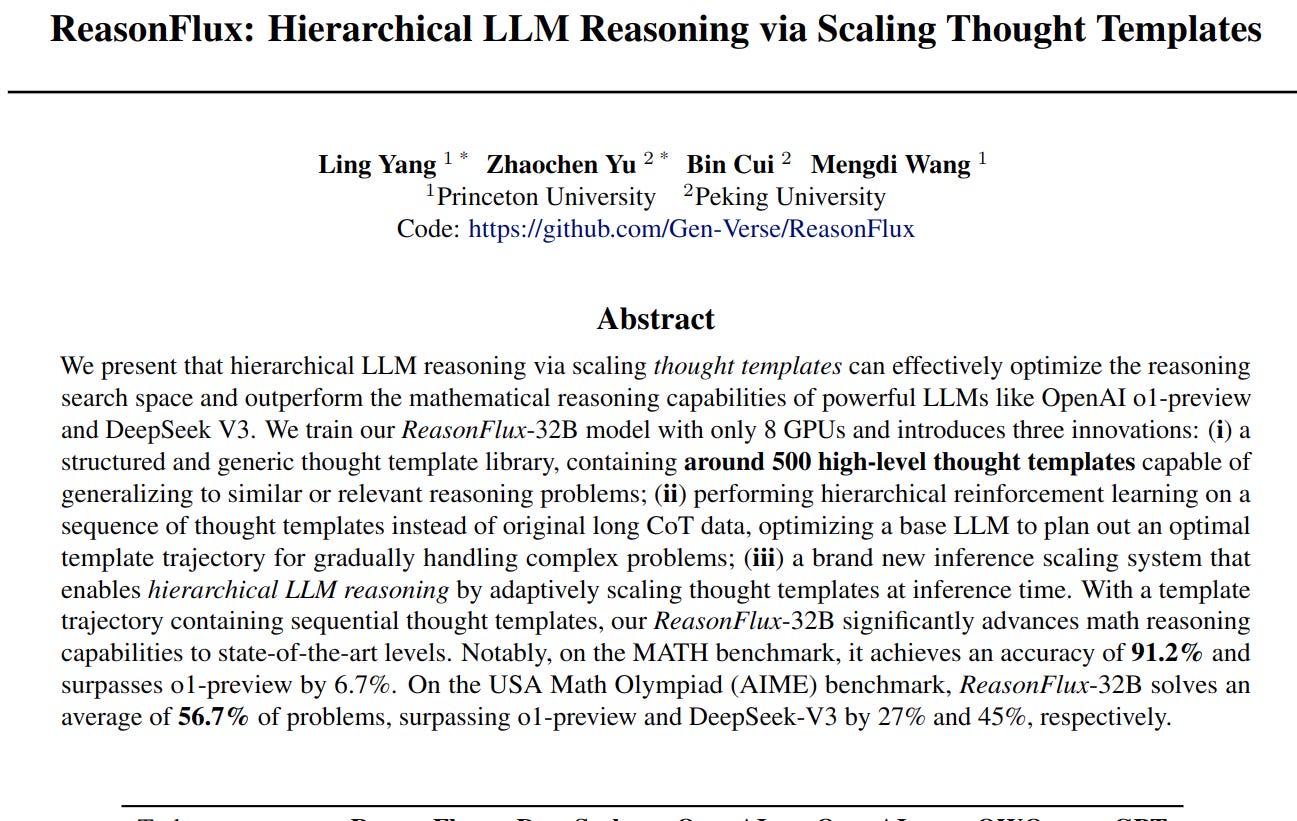"ReasonFlux: Hierarchical LLM Reasoning via Scaling Thought Templates"
Below podcast on this paper is generated with Google's Illuminate.
https://arxiv.org/abs/2502.06772
The challenge lies in enhancing LLMs' (LLMs) complex reasoning, particularly in tasks like math problem-solving, which demands extensive search and fine-grained thinking. Current methods struggle with efficiency and generalization.
This paper introduces ReasonFlux. It addresses these limitations through hierarchical LLM reasoning. ReasonFlux uses scaled thought templates to optimize the reasoning process.
-----
📌 ReasonFlux tackles complex reasoning via structured thought templates. This is a form of knowledge distillation. It encodes expert problem-solving strategies into reusable modules, significantly boosting mathematical reasoning accuracy for LLMs.
📌 Hierarchical reinforcement learning on template trajectories is a key innovation. It moves beyond step-by-step Chain of Thought. By optimizing template sequences, ReasonFlux learns effective high-level reasoning plans, improving generalization.
📌 ReasonFlux's adaptive template scaling at inference enables efficient problem exploration. This dynamic approach contrasts with static inference methods. It achieves a better exploration-exploitation trade-off, leading to superior performance on challenging benchmarks.
----------
Methods Explored in this Paper 🔧:
→ ReasonFlux employs a structured thought template library. This library contains around 500 high-level templates. These templates are designed for efficient retrieval and adaptation to various reasoning problems.
→ Hierarchical reinforcement learning is used. It optimizes a base LLM to create optimal template trajectories. This is done on sequences of thought templates, not raw Chain of Thought data. This helps in planning solutions for complex problems step-by-step using templates.
→ A new inference scaling system is introduced. This system adaptively scales thought templates during inference. It enables hierarchical LLM reasoning by dynamically selecting and applying templates. This adaptive scaling aims to balance exploration and exploitation in the reasoning process.
-----
Key Insights 💡:
→ ReasonFlux simplifies complex reasoning by using hierarchical template-based approach. It moves from searching in the vast original problem space to a more manageable template space.
→ The structured template library is crucial for efficient retrieval of relevant knowledge. Templates are designed to be reusable and generalizable across similar problems.
→ Hierarchical reinforcement learning allows the model to learn effective strategies for combining and sequencing thought templates. This leads to better planning of reasoning paths.
→ Adaptive template scaling at inference allows for dynamic problem-solving. ReasonFlux adjusts its approach based on the problem's complexity, improving efficiency and accuracy.
-----
Results 📊:
→ ReasonFlux-32B achieves 91.2% accuracy on the MATH benchmark. This surpasses OpenAI o1-preview by 6.7%.
→ On the AIME 2024 benchmark, ReasonFlux-32B achieves 56.7% accuracy. This outperforms o1-preview by 27% and DeepSeek-V3 by 45%.
→ ReasonFlux-32B achieves 63.3% accuracy on OlympiadBench, exceeding DeepSeek-V3 by 14%.


